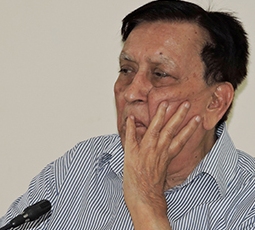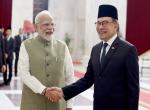The principle of application of Uniform Civil Code contained in the Directive Principles under Article 44 of the Constitution, describes “The state shall endeavour to secure a uniform civil code for all citizens throughout the territory of India”. This provision of the Directive Principles could not be made possible inspite of sixty- six years of independence even though the Supreme Court, on number of occasions, expressed distress over the government’s failure in enacting a common civil code to end discrimination between various religious communities in matters of marriage, succession and property.
The spine of the controversy surrounding the uniform civil code has been the issue of secularism even though the Preamble of the Constitution states that India is a “Secular Democratic Republic” which clearly means that there is no state religion. A secular state shall not discriminate against any one on the ground of religion. It is not concerned with relation of man with God. In the matter of S R Bommai Vs Union of India (1994), as per Justice Jeevan Reddy, it was held that the religion is the matter of individual faith and cannot be mixed with secular activities. Secular activities can be regulated by the state by enacting laws.
The objection to the implementation of uniform civil code is not a new phenomenon. The objection against it was raised by some Muslim members even in the Constituent Assembly when the motion was placed and debated on 23 November 1948. Some of the Muslim members put forward several objections on the ground of religion and placed amendments. But after thorough debate their amendments were negatived and the motion was adopted.
Mohammad Ismail Sahib (Madras: Muslim) while placing his amendment had argued “if anything is done affecting the personal laws, it will be tantamount to interference with the way of life of those people who have been observing these laws for generations and ages. This secular state which is trying to create should not do anything to interfere with the way of life and religion of the people. Another Muslim member Naziruddin Ahmed while supporting Mohammad Ismail argued “in fact, each community, each religious community has certain laws, certain civil laws inseparably connected with religious beliefs and practices. I believe that in framing a uniform draft code, these religious laws or semi-religious laws should be kept out of its way?” He further said that “what the British in 175 years failed to do or was afraid to do, what the Muslims in the course of 500 years refrained from doing, we should not give power to the state to do all at once.”
Mahmoob Ali Baig Sahib Bahadur (Madras) advocating on the same lines said that “I wish to submit that they are overlooking the very important fact of the personal law being so much dear and near to certain religious communities. As far as Mussalmans are concerned, their laws of succession, inheritance, marriage and divorce are completely dependent upon their religion”.
B. Pocker Sahib Bahadur (Madras: Muslim) while placing his amendment went a step further and said that “it is a tyrannous provision which ought not to be tolerated; and let it not be taken that I am not voicing forth the feelings of the Mussalmans. In saying this, I am voicing forth the feelings of ever so many sections in this country who feel that it would be tyrannous to interfere with the religious practices, and with the religious laws, which they are governed now. He further said, “I wish to submit that they are overlooking the very important fact of the personal law being so much dear and near to religious communities. As far as Mussalmans are concerned, their laws of succession, inheritance, marriage and divorce are completely dependent upon their religion”.
While supporting the motion on Uniform Civil Code, KM Munshi (Bombay: General and Alladi Krishnaswami Ayyar (Madras: General) put forth some such forceful arguments that it did not leave any scope to accept the amendments of Muslim members. Their arguments were so strong and logical that Dr. B. R Ambedkar refused to accept the amendments which were moved to this Article.
K M Munshi submitted that “…It must be remembered that if this clause is not put in, it does not mean that the Parliament in future would have no right to enact a civil code. The only restriction to such a right would be Article 19 (Protection of certain rights) of the Constitution and I have already pointed out that Article 19, accepted by the House unanimously, permits legislation covering secular activities. The whole object of this Article is that as and when the Parliament thinks proper or rather when the majority in the Parliament thinks proper an attempt may be made to unify the personal law of the country.
“….A further argument has been advanced that the enactment of civil code is tyrannical to minorities. Is it tyrannical? Nowhere in advanced Muslim countries, the personal law of each minority has been recognized as so sacrosanct as to prevent the enactment of Civil Code. Take for instance Turkey or Egypt. No minorities in these countries are permitted to have such rights. But I go further. When the Shariat Act was passed or when certain laws were passed in the Central Legislature in the old regime, the Khojas and Cutchi Memons were highly dissatisfied. Then they followed certain Hindu customs; for generations since they became converts they had done so. They did not want to conform to the Shariat; and yet by a legislation of the Central Legislature certain Muslim members who felt that Shariat law should be enforced upon the whole community carried their point. The Khojas and Cutchi Memons most unwillingly had to submit to it. Where were the rights of minority then? When you want to consolidate a community, you have to take into consideration the benefit which may accrue to the whole community and not to the customs of a part of it”.
Munshi further submitted that “It is therefore, not correct to say that such an act is tyranny of the majority. If you will look at the countries in Europe which have a civil code, everyone who goes there from any part of the world and every minority, has to submit to the Civil Code. It is not felt to be tyrannical to the minority. The point however is this, whether we are going to consolidate and unify our personal law in such a way that the way of life of the whole country may in course of time be unified and secular. We want to divorce religion from personal law, from what may be called social relations or from the rights of parties as regards inheritance or succession. What have these things to do with religion I fail to understand?”
While citing examples of the Hindu Law Draft, which was before the Legislative Assembly, K M Munshi submitted “if one looks at Manu, Yagnyavalkya and all the rest of them, I think most of the provisions of the new Bill will run counter to their injunctions. But after all we are an advancing society. We are in a stage where we must unify and consolidate the nation by every means without interfering with religious practices”.
K M Munshi while elaborating his point further said “… I know there are many among Hindus who do not like a Uniform Civil Code, because they take the same view as the honourable Muslim members who spoke last. They feel that personal law of inheritance; succession etc is really a part of their religion. If that were so, you can never give, for instance equality to women. But you have already passed a Fundamental Right to that effect and you have an Article here which lays down that there should be no discrimination against sex. Look at Hindu Law; you get any amount of discrimination against women; and if that is part of Hindu religion or Hindu religious practice, you can not pass a single law which would elevate the position of Hindu women to that of men. Therefore, there is no reason why there should not be a civil code throughout the territory of India”.
Munshi held the British rule responsible for this mindset. He said that “… this attitude of mind perpetuated under the British rule, that personal law is part of religion, has been fostered by the British and by the British courts. We must therefore, outgrow it. If I may just remind the honourable Member who spoke last of a particular incident from Freshta which comes to my mind, Allauddin Khilji made several changes which offended against the Shariat, though he was the first ruler to establish Muslim Sultanate here. The Kazi of Delhi objected to some of his reforms, and his reply was ‘I am an ignorant man and I am ruling this country in its best interests. I am sure, looking at my ignorance and my good intentions, the Almighty will forgive me, when he finds that I have not acted according to Shariat’. If Alauddin could not, much less can a modern government accept the proposition that religious rights over personal law or several other matters which we have been unfortunately trained to consider as part of our religion. That is my submission.”
Munshi’s submission was fully supported by another Member Alladi Krishnaswami Ayyar (Madras: General). Krishnaswami submitted that “A civil code has been pointed out, runs into every department of civil relations, to the law of contracts, to the law of property, to the law of succession, to the law of marriage and similar matters. How can there be any objection to the general statement here that the state shall endeavour to secure a Uniform Civil Code throughout the territory of India?”
While contradicting the arguments of Muslim members that their religion would be put to danger, Krishnaswami said “the second objection was that the religion was in danger, that communities can not live in amity if there is to be Uniform Civil Code. The Article actually aims at amity. It does not destroy amity. The idea is that differential systems of inheritance and other matters are some of the factors which contribute to differences among the different peoples of India. What it aims at is to try to arrive at a common measure of agreement in regard to these matters. It is not as if one legal system is not influencing or being influenced by another legal system”.
While replying to B Pocker (Muslim member) who had levelled an attack against the Drafting Committee on the ground that they did not know their business, Krishnaswami said “I should like to know whether he has carefully read what happened even in the British regime. You must know that the Muslim law covers the field of contracts, the field of criminal law, the field of divorce law, the field of marriage and every part of law as contained in the Muslim law. When British occupied this country, they said, we are going to introduce one criminal law in this country which will be applicable to all citizens, be they Englishmen, be they Hindus, be they Muslims. Did the Muslims take exception, and did they revolt against the British for introducing a single system of criminal law.”
Krishnaswami further argued “Now again there are Muslims and there are Hindus, there are Catholics, there are Christians, and there are Jews, in different European countries. I should like to know from Mr Pocker whether different personal laws are perpetrated in France, in Germany, in Italy and in all continental countries of Europe, or whether the laws of succession are not coordinated and unified in the various states. He must have made a detailed study of Muslim jurisprudence and found out whether in all those countries, there is single system of law or different systems of law”.
After hearing forceful arguments of K M Munshi and Alladi Krishnaswami Ayyar, Dr Ambedkar while rejecting the amendments said “I am afraid I can not accept the amendments which have been moved to this article. In dealing with this matter, I do not propose to touch on the merits of the question as to whether this country should have a civil code or it should not. That is a matter which I think has been dealt with sufficiently for the occasion by my friend Mr. Munshi as well as by Shri Alladi Krishnaswami Ayyar”.
Ambedkar while making his observation on the amendments said “… I think most of my friends who have spoken on this amendment have quite forgotten that up to 1935 the North- West Frontier Province was not subject to Shariat Law. It followed the Hindu Law in the matter of succession and in other matters, so much so that it was in 1939 that the Central Legislature had to come into the field and to abrogate the application of the Hindu Law to the Muslims of North – West Frontier Province and to apply the Shariat Law to them”.
He further observed “My honourable friends have forgotten that apart from the North- West Frontier Province, up till 1937 in the rest of India, in various parts, such as the United Provinces, the Central Provinces and Bombay, the Muslims to a large extent were governed by the Hindu Law in the matter of succession. In order to bring them on the plane of uniformity with regard to other Muslims who observed the Shariat Law, the legislature had to intervene in 1937 and to pass an enactment applying the Shariat Law to the rest of India. I am also informed by my friend Karunakara Menon, that in the North Malabar the Marumakkathayam Law applied to all – not only to Hindus but also to Muslims. It is to be remembered that the Marumakkathayam Law is a matriarchal form of law and not a patriarchal form of law”.
The excerpts of the debate in the Constituent Assembly, on the issue of Uniform Civil Code, mentioned above, does not leave any scope for any further discussion on this subject. The debate is so exhaustive, logical and convincing for all sections that is ample proof to show that it has nothing to do with the religion. Even then, its enactment is delayed and Article 44 of the Directive Principles of the Constitution is kept waiting is a matter of surprise. No further argument for its implementation is needed. The entire country is anxiously waiting to see whether the new government would now make a serious endeavour to secure for the citizens a Uniform Civil Code which is overdue in the absence of any effective or serious move by the earlier governments.
Courtesy: Vivek: Issues and Options; May-June 2014, Image source: http://i1.wp.com
Disclaimer: The views and opinions expressed in this article are those of the author and do not necessarily reflect the official policy or position of the Vivekananda International Foundation










Post new comment